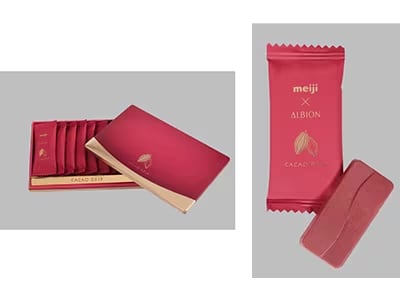The Japanese dairy company claims to be the first to develop and commercialise cacao glucosylceramide.
However, no health claims are made for the two new products.
Meiji said that the launch was to “expand the possibilities of cacao” using cacao glucosylceramide, especially since Albion, a brand under Kose, conducts research on functional plants and sustainability.
“Cacao requires a lot of water to protect itself from the scorching sun. Cacao contains ceramide, a moisturising ingredient, and we have now succeeded in turning cacao glucosylceramide into a [food] material for the first time in the world,” Meiji added.
The new chocolate product, known as meiji X ALBION CACAO DRIP, was also added with Meiji’s proprietary cacao flavanol extract and cacao fruit juice.

As it contains anthocyanin components present in cacao polyphenols, the chocolate comes in red colour. A box of nine pieces is sold at 3,240 yen (US$22).
The other product, known as meiji x ALBION CACAO DRIP JELLY DRINK, contains similar ingredients, with cacao glucosylceramide present in the crushed jelly. It is sold at 1,100 yen (US$7.50).
Both products will only be available for sale for about a month until early February.
Meiji’s cacao study
Meiji has been conducting research in the functional benefits of cacao, one of the latest findings was how consuming a flavonol-rich cacao extract beverage for eight weeks could reduce negative mood. Findings were published in the journal Nutrients.
Teikyo University’s Biomolecular Chemistry Laboratory led by associate professor Niichiro Koga is one of the joint research partners for Meiji.
The laboratory also focuses on studying the role of glucosylceramides and ceramides.
One of their joint research projects found that cacao protein derived from high cacao chocolate could improve intestinal environment.
The exploratory study claims that cacao protein, being an indigestible protein, could act as a base material for stool, increase stool bulk, and improve bowel movements, information from the laboratory’s website has shown. The hypothesis was also tested in a mice study and human study.
The latter found that individuals who ingested high cacao chocolate containing large amount of cacao protein reported improvements in their number of defecations, the amount of defecation, and the colour of stool as compared to pre-intervention.
Another study, published in Nutrition, found that the consumption of cacao polyphenol-rich chocolate could reduce post-meal plasma glucose rise.





